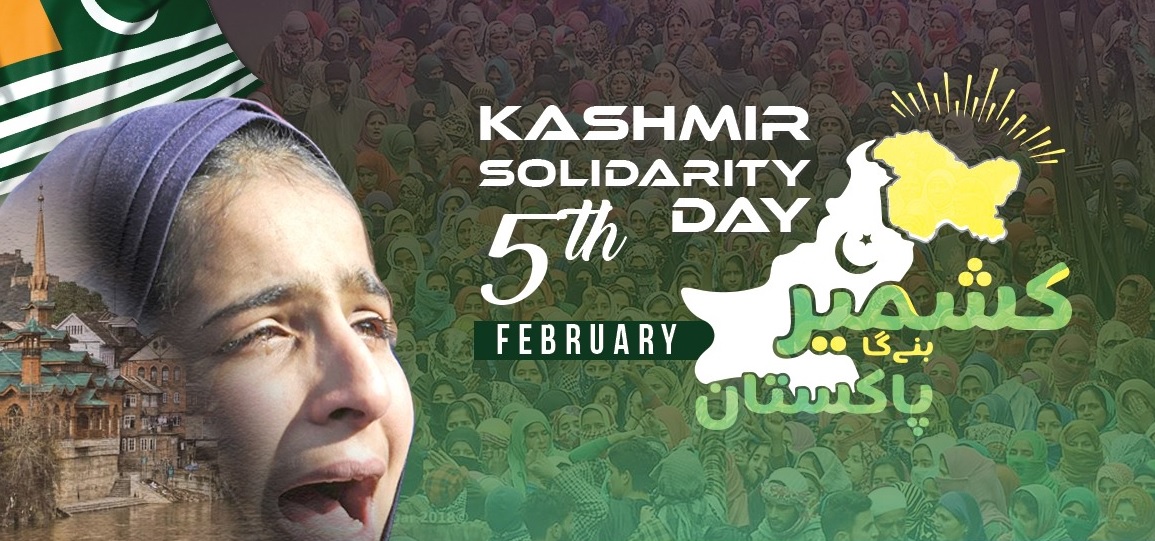- Advertisement -
Abbas Chohan
ISLAMABAD, Feb 04 (APP):Hundreds of thousands Kashmiri and Pakistani people would join hands on February 05, to awaken the world’s conscience to the Indian subjugation of Kashmiri people and commitments made for their right to self-determination under the United Nations Security Council resolutions.
As the day serves as a powerful reminder of the ongoing struggle of Kashmiri people in Illegally Indian Occupied Jammu and Kashmir (IIOJK), it also affirms political, moral and diplomatic support by people of Pakistan and Azad Kashmir to their brethren struggling against Indian thralldom.
Kashmir Solidarity Day is not just an occasion for reflection, but a call to action as it highlights the aspirations of Kashmiri people who have endured violence, oppression and denial of their basic rights for decades.
The conflict in Kashmir dates back to the partition of British India in 1947. But, despite multiple United Nations Security Council (UNSC) resolutions, calling for a plebiscite to determine the will of Kashmiri people, India consistently blocked this process. For 77 years, the people of Indian-occupied Jammu and Kashmir (IIOJK) have faced brutal suppression in their quest for self-determination.
Since 1989, the situation in IIOJK has worsened, with the Indian military’s actions leading to horrific human rights violations. More than 96,000 Kashmiris have lost their lives, 23,000 women have been widowed and over 100,000 homes and schools have been destroyed. The region remains the most heavily militarized zone in the world, with the deployment of approximately 700,000 Indian troops.
The situation took a darker turn in August 2019, when India revoked Kashmir’s special status under Article 370. The subsequent communications blackout, arrests of political leaders, activists, and journalists and deportation and mistreatment of detainees, had compounded the suffering of Kashmiris.
India’s introduction of new domicile laws, enabling non-Kashmiri Hindus to settle in the region, has raised serious concerns about demographic manipulation. By September 2020, approximately 600,000 domicile certificates were issued to non-residents, fueling fears of ethnic cleansing akin to Israel’s policies in Palestine. These actions threaten to undermine Kashmir’s Muslim-majority identity and could influence any future plebiscite.
“Kashmir Solidarity Day is not only about territorial disputes but a struggle for fundamental human rights and dignity,” remarked Federal Minister for Kashmir Affairs and Gilgit-Baltistan Engineer Amir Muqam. “On this solemn day, we stand with the people of Kashmir, reaffirming our commitment to their cause.”
Reiterating resolve of the Pakistan government, its people and Kashmiris living in any part of the world, the minister said, “despite brutal oppression, the struggling people of IIOJK had faced, their resilience remains unbroken.”
Pakistan has long been a staunch advocate for Kashmiris on international platforms, consistently highlighting India’s violations of UNSC resolutions and human rights.
Pakistani nation reaffirms its unwavering support for Kashmiri people on every Solidarity Day as well as on different international forums through diplomatic initiatives, public rallies and media campaigns to ensure that international community remains aware of the ongoing crisis in Kashmir.
However, the global community’s muted response to India’s actions has only emboldened its policies. Many world powers, prioritizing strategic and economic ties with India, have failed to address human rights abuses in Kashmir. This silence not only undermines the credibility of international institutions but also sets a dangerous precedent for ignoring violations of human rights worldwide.
“Recent Indian act of revocation of article 370 is yet another mockery of international laws and the UN resolutions,” said Abdul Hameed Lone, a senior leader of the All Parties Hurriyat Conference (APHC). “Since decades, India was denying people of IIOJK, their just right to self-determination least caring for its international obligations.”
He underscored Pakistan’s long-standing advocacy for Kashmiris and said, “since India’s revocation of Article 370, Pakistan has redoubled its efforts to highlight Kashmir’s plight by engaging with international community and ensuring that voices of oppressed Kashmiris are heard globally.”
Kashmir Solidarity Day is also a reminder for urgent global intervention to resolve Kashmir dispute as it had emerged as a humanitarian crisis, calling upon international community to mobilize organizations and human rights groups to pressure India to end its oppressive policies in IIOJK.
Pakistan, on its part, has always been a strong voice for Kashmiris rights through diplomatic efforts at the United Nations, Organization of Islamic Cooperation and the European Parliament and amplifies voices of Kashmiri activists and victims.
Kanwal Aftab, a Kashmiri student, speaks of the continued suffering of subjugated Kashmiri people despite UN resolutions and reports from the United Nations High Commissioner for Human Rights (OHCHR) documenting severe abuses in Kashmir.
“While no concrete action so far taken against India, its continued oppression against innocent people is an eye opener for the world community,” she remarked. “There cannot be more lethal instances of human rights abuses like in IIOJK where thousands of youth were killed and torturing and innocent women were raped under the nose of international human rights organizations.”
She appreciated Pakistan for consistently raising the Kashmir issue on international forums and said, even after India killed, tortured and subjugated 96,000 Kashmiris since January 1989, they are resolute in their struggle for justice and right to self-determination. “The Solidarity Day reaffirms that their struggle will not be forgotten and their call for justice will not go unanswered.”

